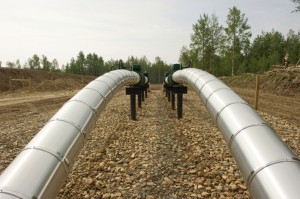
(Photo: Shell)
OTTAWA All of Canada will reap the rewards of moving landlocked Canadian oil to coastal ports to allow its sale to international markets, two of the countrys premiers said Tuesday.
Every province, every region, every community, every Canadian will benefit when were able to diversify our markets and get full value for the resources that we have, New Brunswick Premier Dave Alward told a trade conference hosted by the Canadian Chamber of Commerce.
Alward and his Saskatchewan colleague, Brad Wall, urged provinces like Quebec and ontario against standing in the way of pipeline projects like TransCanadas proposed Energy East line, which they say would speed Canadian oil to market.
Refining and manufacturing industries in both provinces will get a shot in the arm from the pipelines, they asserted.
If we look at it collectively as a country, were all going to benefit, but if we get into this situation wher we look at one individual item or opportunity and dont think were getting enough out of it, then ultimately none of us are going to gain anything, Alward told a receptive business audience.
Were all winners, but the two largest winners are actually ontario and Quebec.
TransCanada recently delayed until next year its goal of filing an application for the $12-billion Energy East project with the National Energy Board. The company said theres too much work to be done to file the application before the end of the year.
The 4,500-kilometre Energy East pipeline would ship up to 1.1 million barrels per day of Alberta oilsands bitumen to refineries and export terminals in Quebec and New Brunswick.
The proposal involves converting a portion of TransCanadas underused natural gas mainline to move oil, and to build 1,400 kilometres of new pipeline to Saint John.
Its one of two projects that have been proposed to transport oil out of Western Canada.
Enbridge plans to spend $110 million to reverse its Line 9B to carry western crude to meet Quebecs refining needs. The National Energy Board, which recently held heated hearings into the proposal, is expected to make a decision on the proposal in 2014.
Wall expressed dismay that Canada seems almost apologetic about the fact that its an energy powerhouse. Canada is third in the world in oil reserves and in the Top 10 in terms of oil production, Wall noted, but were not acting like it.
A country with all of this would find ways to move energy to tidewater, to improve the return to Canadians for the resource, to ensure there are jobs for the future for all of us including First Nations, non-First Nations, for the entire country, he said.
We would do everything we could to ensure we had this great resource working not just for todays economy but helping for the economy of tomorrow. We have to get our head around moving that energy.
Nonetheless, the politics of pipelines has proven a risky business in North America in recent years.
TransCanadas proposed Keystone XL project has become a flashpoint for environmentalists in the U.S., who hold it up as a symbol of dirty oil. U.S. President Barack Obama, who has sent mixed signals about Keystone XL in recent months, is slated to determine the pipelines long-delayed fate some time next year.
Wall said Obamas dismissive remarks over the summer to the New York Times about Keystone XLs job benefits has him feeling pessimistic that the project will win approval.
If I was a seven or eight on the optimism scale, Id probably be about half that right now, he said.
North of the border, meantime, Alberta, Saskatchewan and New Brunswick are staunch supporters of Energy East, but its not clear that other provinces in particular Quebec back the project. Prime Minister Stephen Harper has expressed federal support for the development.
Alward said hes confident Quebec Premier Pauline Marois will ultimately support Energy East.
Both Alberta and New Brunswick have working groups with the province of Quebec, Ive met with the premier on a number of occasions and thus far theyve been very open to the dialogue, he said.
I feel good about the future.




